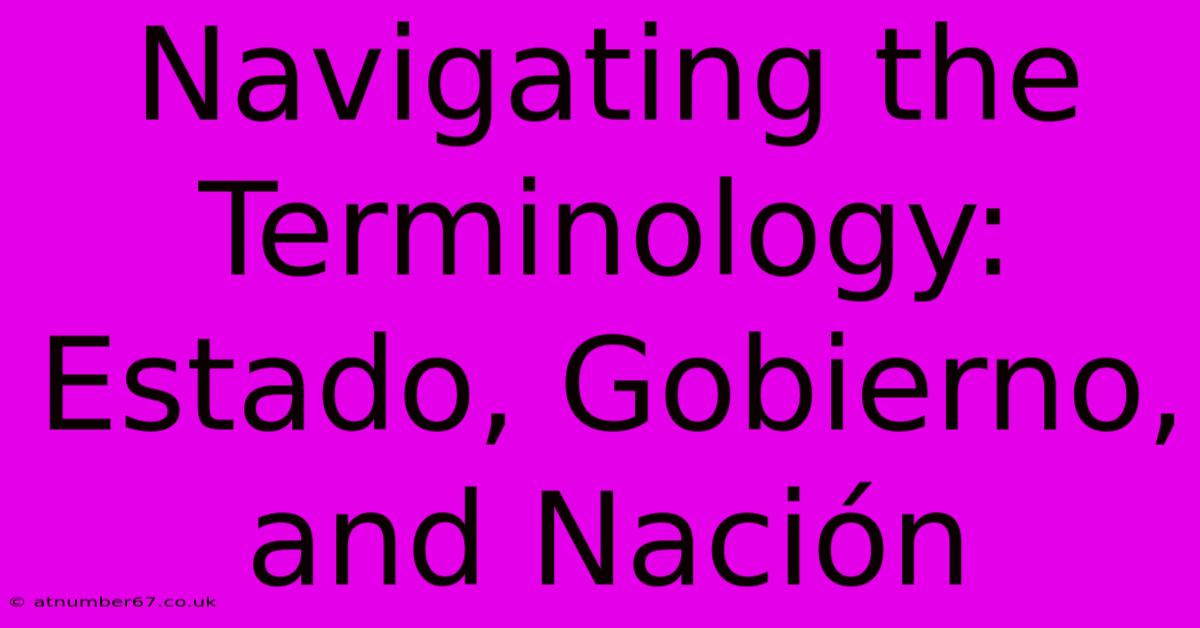Navigating The Terminology: Estado, Gobierno, And Nación

Table of Contents
Navigating the Terminology: Estado, Gobierno, and Nación
Understanding the nuances between Estado, Gobierno, and Nación is crucial for anyone studying political science, history, or law, particularly within the context of Spanish-speaking countries. While often used interchangeably in casual conversation, these terms represent distinct yet interconnected concepts. This article will delve into the precise meanings of each term, highlighting their differences and exploring their relationships.
Defining the Key Terms
Let's start by defining each term individually:
Estado (State):
The Estado refers to the permanent political entity possessing sovereignty over a defined territory. It encompasses the entire apparatus of government, including its institutions, laws, and public services. Think of it as the legal and political framework of a country. Key characteristics of an Estado include:
- Sovereignty: Supreme authority within its territory.
- Territory: A defined geographical area under its control.
- Population: A group of people living within its territory.
- Government: The structure through which the Estado exercises its power.
Gobierno (Government):
The Gobierno represents the group of people who exercise executive power within the Estado. It's the acting administration responsible for implementing the laws and policies of the Estado. This is the temporary, changing aspect of the State. Different political parties can form different Gobiernos, but the Estado remains. The Gobierno comprises:
- Executive branch: The President, Prime Minister, and their cabinet.
- Bureaucracy: The civil servants who carry out government functions.
- Agencies and departments: The various organizations that implement government policy.
Nación (Nation):
The Nación is a cultural and social entity, characterized by a shared identity, language, history, and often, a sense of collective destiny. It's about the people themselves, their shared values, and their sense of belonging. Unlike the Estado, a Nación doesn't necessarily have to correspond to a defined territory; it can exist across borders, or even without a state to represent it. A Nación is defined by:
- Shared culture: Common language, traditions, and values.
- Collective identity: A sense of belonging and unity.
- History: Shared experiences and narratives.
- National consciousness: Awareness of being part of a larger group.
Interrelationships and Distinctions
While distinct, these three concepts are intrinsically linked:
- The Estado provides the framework, the legal and political structure, within which the Nación and Gobierno operate.
- The Gobierno is the instrument through which the Estado exercises its power and works to represent the interests (or at least, the will) of the Nación.
- The Nación provides the social and cultural foundation for the legitimacy and stability of the Estado. A strong sense of national identity can strengthen the state. Conversely, a fractured national identity can weaken the state.
Examples and Case Studies
Consider the case of Spain. Spain is the Estado, with its defined borders and political institutions. The current administration (the government) is the Gobierno. The Spanish Nación encompasses all those who identify as Spanish, sharing a common culture, history, and language. However, within the Spanish Estado, there are also distinct regional Naciones with their own strong identities, such as the Catalan and Basque Naciones. This highlights how the concepts can overlap and sometimes conflict.
Conclusion
Understanding the subtle yet significant distinctions between Estado, Gobierno, and Nación is essential for grasping the complexities of political systems, particularly in Latin America and Spain. By recognizing their individual characteristics and interconnectedness, we can better understand the dynamics of power, governance, and national identity. This detailed analysis helps navigate the complexities of political structures and fosters a deeper understanding of socio-political realities. Clear differentiation of these terms avoids confusion and enables more precise political discourse.

Thank you for visiting our website wich cover about Navigating The Terminology: Estado, Gobierno, And Nación. We hope the information provided has been useful to you. Feel free to contact us if you have any questions or need further assistance. See you next time and dont miss to bookmark.
Featured Posts
-
Salish Matter Age A Guide To Self Discovery
Apr 01, 2025
-
Shahid Kapoor Age His Journey From Debut To Icon
Apr 01, 2025
-
Toto Wolffs Net Worth Fueling Innovation And Progress
Apr 01, 2025
-
Carly Teen Mom From Teen To Triumph
Apr 01, 2025
-
Bam Margera Net Worth What The Future Holds
Apr 01, 2025
